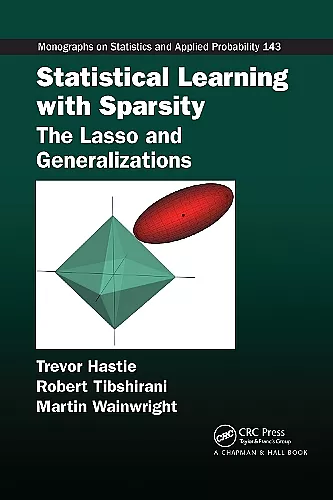Statistical Learning with Sparsity
The Lasso and Generalizations
Martin Wainwright author Trevor Hastie author Robert Tibshirani author
Format:Paperback
Publisher:Taylor & Francis Ltd
Published:18th Dec '20
Should be back in stock very soon
This paperback is available in another edition too:
- Hardback£120.00(9781498712163)

Discover New Methods for Dealing with High-Dimensional Data
A sparse statistical model has only a small number of nonzero parameters or weights; therefore, it is much easier to estimate and interpret than a dense model. Statistical Learning with Sparsity: The Lasso and Generalizations presents methods that exploit sparsity to help recover the underlying signal in a set of data.
Top experts in this rapidly evolving field, the authors describe the lasso for linear regression and a simple coordinate descent algorithm for its computation. They discuss the application of ℓ1 penalties to generalized linear models and support vector machines, cover generalized penalties such as the elastic net and group lasso, and review numerical methods for optimization. They also present statistical inference methods for fitted (lasso) models, including the bootstrap, Bayesian methods, and recently developed approaches. In addition, the book examines matrix decomposition, sparse multivariate analysis, graphical models, and compressed sensing. It concludes with a survey of theoretical results for the lasso.
In this age of big data, the number of features measured on a person or object can be large and might be larger than the number of observations. This book shows how the sparsity assumption allows us to tackle these problems and extract useful and reproducible patterns from big datasets. Data analysts, computer scientists, and theorists will appreciate this thorough and up-to-date treatment of sparse statistical modeling.
"The authors study and analyze methods using the sparsity property of some statistical models in order to recover the underlying signal in a dataset. They focus on the Lasso technique as an alternative to the standard least-squares method."
—Zentralblatt MATH 1319
"The book includes all the major branches of statistical learning. For each topic, the authors first give a concise introduction of the basic problem, evaluate conventional methods, pointing out their deficiencies, and then introduce a method based on sparsity. Thus, the book has the potential to be the standard textbook on the topic."
—Anand Panangadan,California State University, Fullerton
"It always first discusses regularized models based on equations, followed by example applications, before ending with a bibliography section detailing the historical development of the given method. Software recommendations (mostly open source R packages) are typically provided either in the main part or bibliography section of each chapter. And each chapter concludes with a set of selected exercises meant to deepen the gained knowledge on the given subject, which of course is of great help for teachers of statistics. For these reasons, we congratulate the authors of Statistical Learning with Sparsity and recommend the book to all statistically-inclined readers from intermediate to expert levels. In addition, it is worth pointing out that even for non-statisticians, the book is able to demonstrate,based on numerous real-world examples, the power of regularization."—Ivan Kondofersky and Fabian J. Theis, Institute for Computational Biology
"The authors study and analyze methods using the sparsity property of some statistical models in order to recover the underlying signal in a dataset. They focus on the Lasso technique as an alternative to the standard least-squares method."
—Zentralblatt MATH 1319
"The book includes all the major branches of statistical learning. For each topic, the authors first give a concise introduction of the basic problem, evaluate conventional methods, pointing out their deficiencies, and then introduce a method based on sparsity. Thus, the book has the potential to be the standard textbook on the topic."
—Anand Panangadan,California State University, Fullerton
"It always first discusses regularized models based on equations, followed by example applications, before ending with a bibliography section detailing the historical development of the given method. Software recommendations (mostly open source R packages) are typically provided either in the main part or bibliography section of each chapter. And each chapter concludes with a set of selected exercises meant to deepen the gained knowledge on the given subject, which of course is of great help for teachers of statistics. For these reasons, we congratulate the authors of Statistical Learning with Sparsity and recommend the book to all statistically-inclined readers from intermediate to expert levels. In addition, it is worth pointing out that even for non-statisticians, the book is able to demonstrate,based on numerous real-world examples, the power of regularization."—Ivan Kondofersky and Fabian J. Theis, Institute for Computational Biology
ISBN: 9780367738334
Dimensions: unknown
Weight: 640g
368 pages